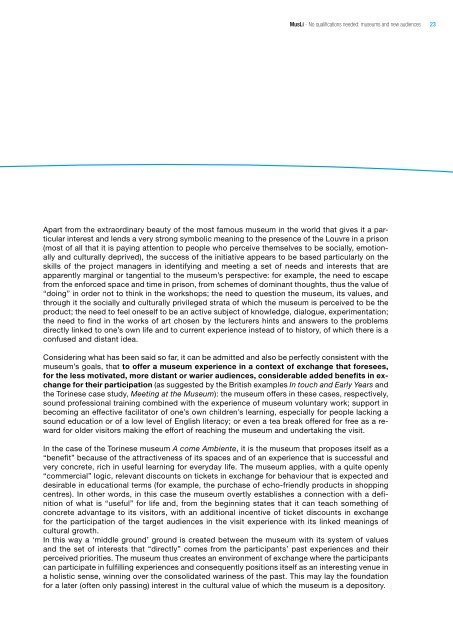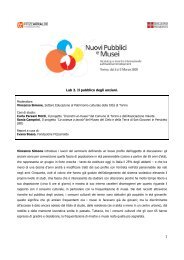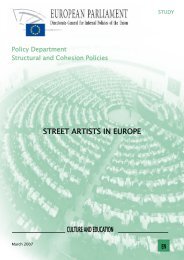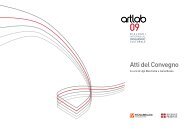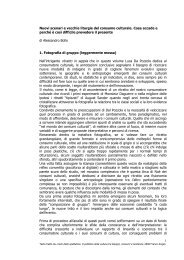MusLi (Museums Literacy) - Fondazione Fitzcarraldo
MusLi (Museums Literacy) - Fondazione Fitzcarraldo
MusLi (Museums Literacy) - Fondazione Fitzcarraldo
Create successful ePaper yourself
Turn your PDF publications into a flip-book with our unique Google optimized e-Paper software.
<strong>MusLi</strong> - No qualifications needed: museums and new audiences<br />
Apart from the extraordinary beauty of the most famous museum in the world that gives it a particular<br />
interest and lends a very strong symbolic meaning to the presence of the Louvre in a prison<br />
(most of all that it is paying attention to people who perceive themselves to be socially, emotionally<br />
and culturally deprived), the success of the initiative appears to be based particularly on the<br />
skills of the project managers in identifying and meeting a set of needs and interests that are<br />
apparently marginal or tangential to the museum’s perspective: for example, the need to escape<br />
from the enforced space and time in prison, from schemes of dominant thoughts, thus the value of<br />
“doing” in order not to think in the workshops; the need to question the museum, its values, and<br />
through it the socially and culturally privileged strata of which the museum is perceived to be the<br />
product; the need to feel oneself to be an active subject of knowledge, dialogue, experimentation;<br />
the need to find in the works of art chosen by the lecturers hints and answers to the problems<br />
directly linked to one’s own life and to current experience instead of to history, of which there is a<br />
confused and distant idea.<br />
Considering what has been said so far, it can be admitted and also be perfectly consistent with the<br />
museum’s goals, that to offer a museum experience in a context of exchange that foresees,<br />
for the less motivated, more distant or warier audiences, considerable added benefits in exchange<br />
for their participation (as suggested by the British examples In touch and Early Years and<br />
the Torinese case study, Meeting at the Museum): the museum offers in these cases, respectively,<br />
sound professional training combined with the experience of museum voluntary work; support in<br />
becoming an effective facilitator of one’s own children’s learning, especially for people lacking a<br />
sound education or of a low level of English literacy; or even a tea break offered for free as a reward<br />
for older visitors making the effort of reaching the museum and undertaking the visit.<br />
In the case of the Torinese museum A come Ambiente, it is the museum that proposes itself as a<br />
“benefit” because of the attractiveness of its spaces and of an experience that is successful and<br />
very concrete, rich in useful learning for everyday life. The museum applies, with a quite openly<br />
“commercial” logic, relevant discounts on tickets in exchange for behaviour that is expected and<br />
desirable in educational terms (for example, the purchase of echo-friendly products in shopping<br />
centres). In other words, in this case the museum overtly establishes a connection with a definition<br />
of what is “useful” for life and, from the beginning states that it can teach something of<br />
concrete advantage to its visitors, with an additional incentive of ticket discounts in exchange<br />
for the participation of the target audiences in the visit experience with its linked meanings of<br />
cultural growth.<br />
In this way a ‘middle ground’ ground is created between the museum with its system of values<br />
and the set of interests that “directly” comes from the participants’ past experiences and their<br />
perceived priorities. The museum thus creates an environment of exchange where the participants<br />
can participate in fulfilling experiences and consequently positions itself as an interesting venue in<br />
a holistic sense, winning over the consolidated wariness of the past. This may lay the foundation<br />
for a later (often only passing) interest in the cultural value of which the museum is a depository.<br />
23


